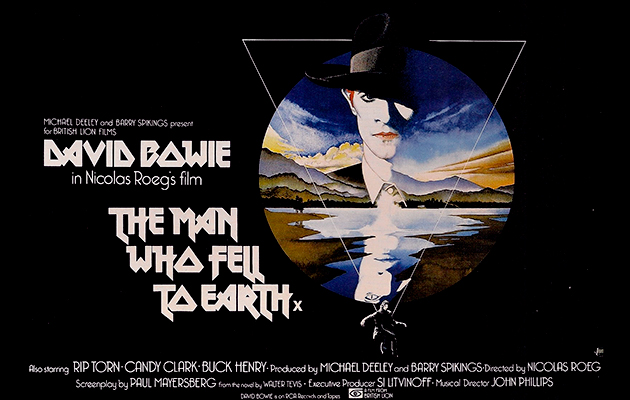
Playing genial host to Uncut in his rammed Notting Hill study in late September 2005, The Man Who Fell To Earth’s director recalls the impact of Cracked Actor 30 years on.
“It seemed Bowie was slightly to one side of pop star, just like Dylan,” says Roeg. “He was coming in from leftfield, using a lot of odd disguises and dressing up. Watching him in the limo talking, I noticed the artificial voice. It wasn’t definable as a brogue or accent. It was English, but you couldn’t tell exactly where from. It was all quite curious.”
The Man Who Fell To Earth was trailed as a “powerful love story, a cosmic mystery, a spectacular fantasy – a shocking, mind-stretching experience in sight, in space and sex”. Already boasting an extraordinary CV that included Performance, Walkabout and Don’t Look Now, Roeg’s was a science-fiction film in surface detail only. Channelled through Bowie’s character (Thomas Jerome Newton), Roeg pursued his interests in the themes of dislocation, communication, time, and the conflict between our inner and outer lives. Set against the eerie beauty of the New Mexico landscape, it had more to do with man’s fall from Eden than any far-flung galaxy. Invasion Of The Body Snatchers it wasn’t.
At the still centre of Roeg’s sensory-shifting pyrotechnics – what he called the film’s “fractured grammar” – was the character of Newton, reclusive and uncomfortably numb in a vast new world that gradually began to suck away his innocence. With his frail demeanour and delivery, Newton seemed an extension of Bowie. All strange sex, breathtaking cinematography and weird science, The Man Who Fell To Earth was one of the most ambitious and brilliant fantasies of the last century. You can trace its time-as-liquid motif through everything from Memento to Donnie Darko, but even three decades on, there’s really never been anything like it.
Roeg entered David Bowie’s life at a critical point. The transatlantic success the singer had long desired had become reality. Despite the UK phenomenon that was Ziggy, America had remained oblivious to his moonage daydreams. It wasn’t until David Live (released in late October ’74) that Bowie dented the US Top 10. The critics were finally drooling, too.
The Diamond/Philly Dogs tour had been physically and mentally sapping, but it proved an artistic and commercial triumph. In March ’75, the cerebral soul of Young Americans consolidated his position, while the John Lennon co-write “Fame” would land him his first Billboard chart-topper in August.
And yet all was not well on Planet Bowie, as evinced by Cracked Actor. The strain showed in Bowie’s face. Emaciated and chalk-white, his orange hair only made his appearance more shocking. In public, he seemed agitated. Interviewed on Dick Cavett’s Wide World Of Entertainment the previous December, Bowie squirmed in his chair, fidgeting with a walking cane and constantly sniffing. His coke habit was getting serious. Cavett’s questions didn’t help. “What is your private life like?” he asked. An ill-at-ease Bowie shifted in his chair, muttered, “Do you mind if I take this off?” and discarded his coat. Elsewhere, the host wondered why rock stars tend to have premonitions of doom. “’Cause they’re pretty nutty to be doing it in the first place,” grinned Bowie. “You know, very tangled minds.
Very messed-up people.” “It was horrendous,” Bowie recalled in 1994. “I had no idea where I was, I couldn’t hear the questions… I was out of my gourd.”
Interviewed by US magazine Creem, Bowie waxed lyrical about UFOs, Hitler and conspiracy theories. He was approaching mental collapse (a point he’d reach later in 1975, when a narcoleptic existence and self-abuse left him prey to all manner of demons). Young Americans went on to lodge itself in the American charts for nearly a year, but its creator dismissed it – to Rolling Stone’s Cameron Crowe – as “the squashed remains of ethnic music as it survives in the age of Muzak Rock, written and sung by a white limey”.
In April ’75 came another apocalyptic farewell: “I’ve rocked my roll. It’s a boring dead end. There will be no more rock’n’roll records or tours from me. The last thing I want to be is some useless fucking rock singer.”
All of which made Nic Roeg’s offer of the lead in his adaptation of Walter Tevis’ 1963 novel even more appealing.


